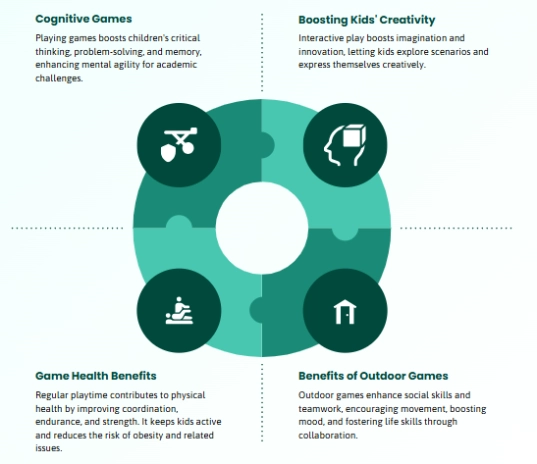Games are key to how kids learn. “Learning through play” catches the eye of parents, teachers, and child experts because it helps kids grow smarter, make friends, and handle feelings better. Games let kids pick up skills in a fun way, helping them understand the importance of games. They push kids to think hard, fix problems, and make smart choices. They also help kids work together, talk to each other, and be team players.
Plus, games give kids a safe place to try new things and learn new stuff. This builds their confidence and makes them want to keep learning for life. As we find new ways to teach, we can’t forget how much games matter in schools. Let us find the importance of games for kids and students.
Importance of Games in Cognitive Development

Games hold major significance in helping kids and teens grow their brains acting as fun ways for them to pick up really important skills. Studies have shown playing games that you interact with boosts how your brain works, makes you better at solving problems, and helps you think more .
When kids dive into games, the growth in their thinking skills happens as they figure out the rules, come up with game plans, and switch things up when situations change. Like, with board games, you’ve got to think multiple steps ahead and chew on your options, which is great for honing your logic skills.
And not to forget, video games are ace at making you more aware of your surroundings and pumping up your coordination between what you see and how you move. Plus, games are spot-on for getting you to mingle with others. When you team up in games, you’re learning to chat better and to work with others, and you’re also picking up how to bargain and smooth over any arguments.
This team thing in gaming is super key for getting better at understanding one’s own and others’ feelings. Putting games into schools makes stuff fun and helps kids grasp book-smart ideas in real-life ways. When teachers and grown-ups get how big a deal games are for brain growing, they can whip up way better places for learning that use playtime to make brains bigger.
Importance of Games in Building Creativity in Kids
Playing games is important for kids and young people because it’s not all about fun. A big plus of playing games is how it builds up kids’ creative minds. Whenever kids dive into all kinds of games like board games, video games, or playing outside, they have to get their thinking hats on and figure stuff out. This gives their imagination a workout and makes both parents and kids understand the importance of games.
Kids get to try out different stuff and act out various roles when they’re playing, and that’s a super way for them to just be themselves. By exploring, kids pump up their creative thinking and get bold about trying out fresh ideas, not sweating it if they mess up. Also, tons of games have kids working together and chatting with their buddies, which is super good for learning how to play nice with others and how to rock at working in a team.
Importance of Games in Physical Education
Kids and teens level up when they play games. It’s all about getting those gains for their overall health. Messing around with different kinds of games is also awesome for getting their moves slicker, keeping them steady on their feet, and boosting their fitness game. When they run, hop, and chuck things around, their muscles bulk up, and their hearts pump better.
Plus, choosing to game it up instead of vegging out is a killer move against the whole getting too chunky issue that’s hitting young folks hard these days. Making a habit of active play sets them up for keeping fit for the long haul. And when they get into team sports, they’re not just working out their bodies but they’re also learning to stick with stuff and bounce back all while getting their chat on and playing nice with others.
Importance of Games Played Outside
Playing games outside is super important for the growth of kids and students, not just for fun. It helps keep them active, which is super important to beat obesity and get fit. Playing with others is cool too because it helps little ones get better at getting along talking things out, and sorting out arguments. Plus, doing stuff together boosts their confidence and they learn to bounce back from tough times.
Playing outside also sharpens smarts like coming up with strategies and making snappy choices, stuff that helps at school. Being in nature makes kids better at paying attention and thinking up new ideas. If we make sure kids play outside a lot, they get awesome experiences that help them keep learning and growing as they get older. Teachers and parents who get this can make a place where learning by playing is a big deal.
Role of Parents in Gaming Habits
As they are most likely to influence gaming habits of their children, it is indeed important for parents to take the charge. They can also help children select games that are developmentally appropriate and that foster learning. Interacting with kids while playing encourages critical thinking and reflection. There must be limits on screen time, with gaming augmented by physical play, reading, and socializing. Importance of games also show how they can be both good and bad for children.
This method encourages healthy habits and gaming benefits. This approach fosters healthy habits while enjoying gaming benefits. Parents can model positive behavior by using games for learning, highlighting educational and skill-building games. Active parental involvement not only enhances learning but also strengthens family bonds through shared activities.
Importance of Games in Family Bonding
Games play a vital role in fostering family bonding providing a platform for parents and children to connect meaningfully. Watching on a screen in theatres or doing fun activities like board games, card games and interactive video games together fosters the art of bonding between family and friends creating long-lasting memories.
Games encourage communication, teamwork and empathetic play; they give families the opportunity to explore themes like cooperation and competition, all while teaching important lessons those lessons about life skills. Strategy-based games improve critical thinking and problem-solving skills, and the laughter and joy experienced during the game will lower stress levels and create an upbeat family atmosphere.
Incorporating educational components into family game nights can actually enhance children’s learning, effectively making academic content stick and reinforcing skills such as math and vocabulary. Aside from entertainment, importance of games strengthens the family and a good way to learn something useful.
Importance of Games in the Future of Education
These games integrate play into learning, therefore, reinforcing the traditional classroom teachings and appealing to different learning styles. For instance, graphic-rich environments are useful for visual learners, and kinesthetic learners can thrive through hands-on activities within the game.
Additionally, gamification in education increases motivation and persistence among students. Gradually moving through levels or earning rewards for completing tasks gives a feeling of accomplishment, which boosts confidence and readiness to take on more complex subjects.
Looking ahead, educational games are going to continue their growth in importance. Technological innovations such as virtual reality and augmented reality, for instance, can be quite a great opportunity for students to experience more immersed learning, making the way through which they learn educational content change with lessons becoming more engaging than ever.
The future of educational games is bright and full of possibilities, making everyone realize the importance of games. We are using the power of play in education to create an environment in which children learn well and find enjoyment in the learning process, thereby preparing them for academic and personal success, which provides us more ground to understand the importance of games.
Conclusion
In summary, we must realize the importance of games for kids and students. Games involve play that fosters creativity, critical thinking, and problem-solving abilities, besides introducing social interaction and teamwork. Knowledgeable educational games for learning assist in achieving academic concepts more easily and in fun ways, increasing the importance of games.
They provide a safe environment where children can test their skills and decisions and learn the consequences to become more resilient and adaptable. The diverse benefits of play make games an integral part of educational environments for holistic child development.




